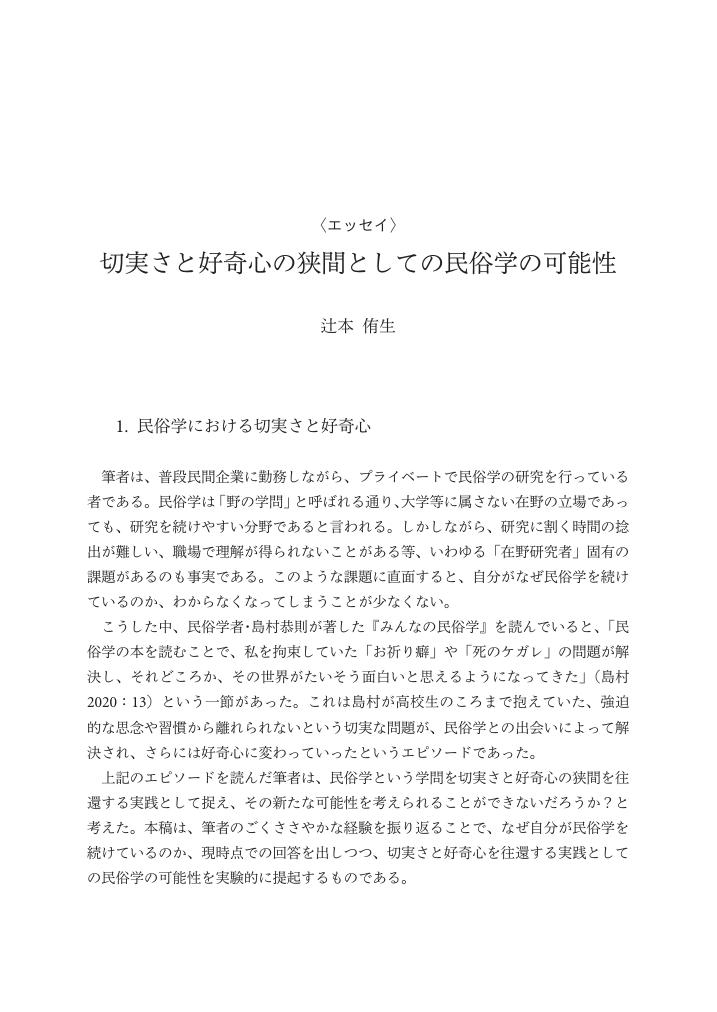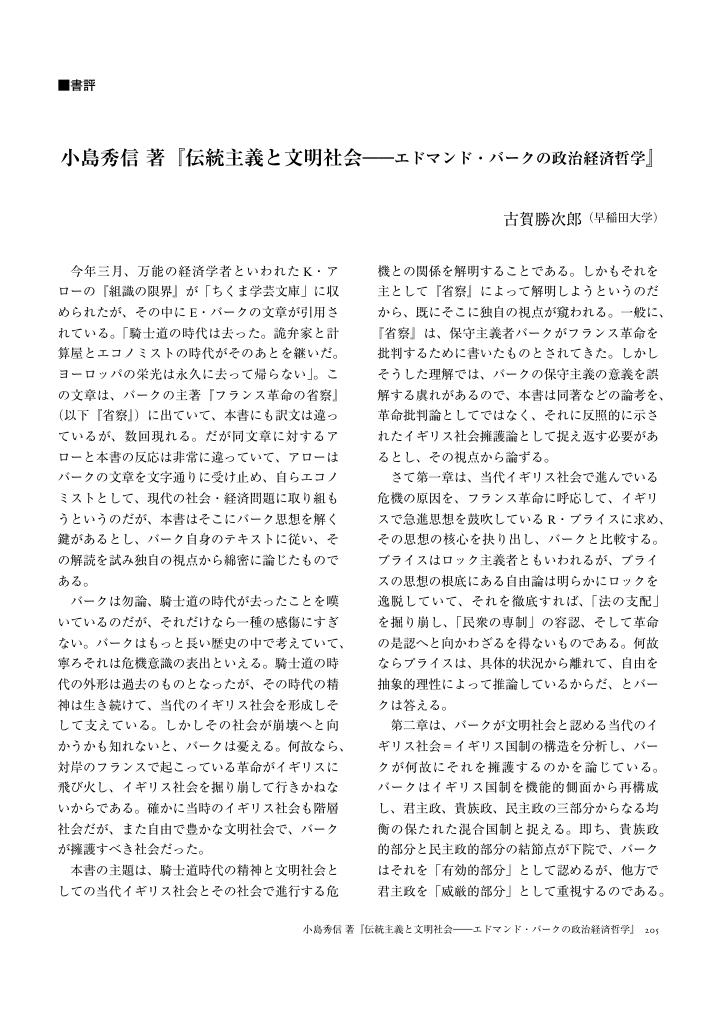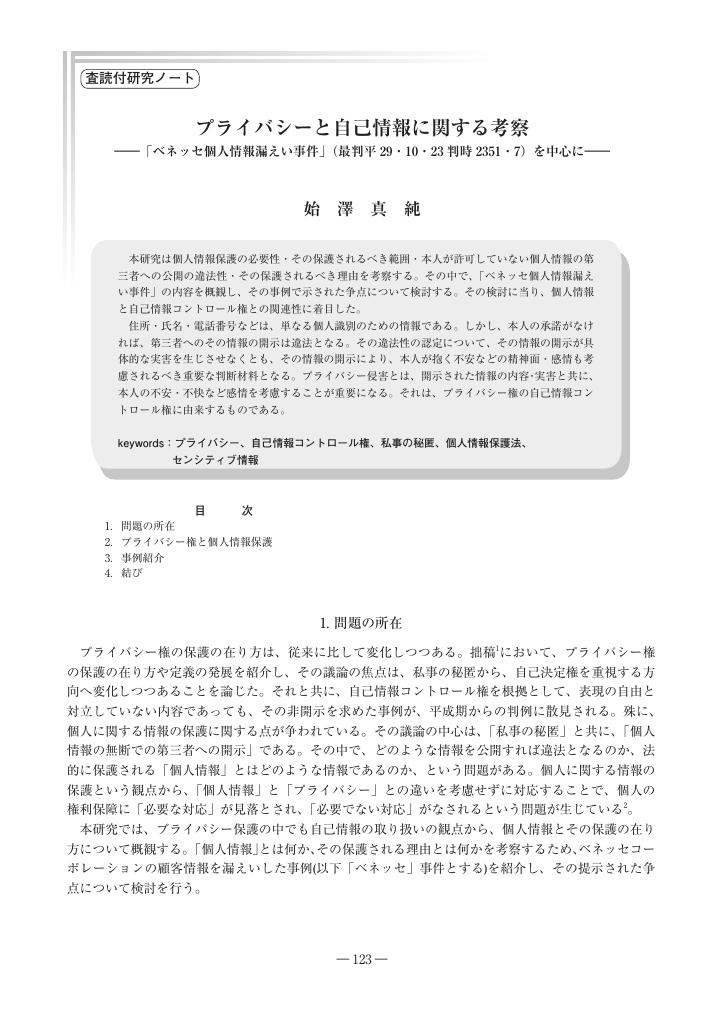2 0 0 0 OA 新型コロナウイルスのワクチン接種義務化をめぐる米国裁判例の動向と検討
- 著者
- 金田 耕一 島田 裕平 竹下 雄太 細野 由莉亜 宮崎 理紗 池田 有梨奈
- 出版者
- 『人文×社会』編集委員会
- 雑誌
- 人文×社会 (ISSN:24363928)
- 巻号頁・発行日
- vol.2, no.5, pp.123-167, 2022-03-15 (Released:2022-03-19)
2 0 0 0 OA 病いと信頼の現象学 病いの語りはどのようにして沈黙してしまうのか
- 著者
- 大橋 一平
- 出版者
- 『人文×社会』編集委員会
- 雑誌
- 人文×社会 (ISSN:24363928)
- 巻号頁・発行日
- vol.1, no.4, pp.1-16, 2021-12-15 (Released:2021-12-19)
- 著者
- 大喜多 紀明
- 出版者
- 『人文×社会』編集委員会
- 雑誌
- 人文×社会 (ISSN:24363928)
- 巻号頁・発行日
- vol.1, no.4, pp.79-96, 2021-12-15 (Released:2021-12-19)
2 0 0 0 OA ポエジーは現実にどう関われるのか バンジャマン・フォンダーヌの詩と哲学をめぐる研究ノート
- 著者
- 伊藤 琢麻
- 出版者
- 『人文×社会』編集委員会
- 雑誌
- 人文×社会 (ISSN:24363928)
- 巻号頁・発行日
- vol.1, no.3, pp.151-165, 2021-09-30 (Released:2021-10-04)
2 0 0 0 OA 切実さと好奇心の狭間としての民俗学の可能性
- 著者
- 辻本 侑生
- 出版者
- 『人文×社会』編集委員会
- 雑誌
- 人文×社会 (ISSN:24363928)
- 巻号頁・発行日
- vol.1, no.2, pp.203-208, 2021-06-15 (Released:2021-06-18)
2 0 0 0 OA 中島力造と読書会 明治後期の西洋哲学受容の一断面
- 著者
- 笠松 和也
- 出版者
- 『人文×社会』編集委員会
- 雑誌
- 人文×社会 (ISSN:24363928)
- 巻号頁・発行日
- vol.1, no.2, pp.173-202, 2021-06-15 (Released:2021-06-18)
2 0 0 0 OA 宮崎駿による長編アニメーション映画「もののけ姫」の構造 キアスムスの核の機能
- 著者
- 大喜多 紀明
- 出版者
- 『人文×社会』編集委員会
- 雑誌
- 人文×社会 (ISSN:24363928)
- 巻号頁・発行日
- vol.1, no.2, pp.129-142, 2021-06-15 (Released:2021-06-18)
2 0 0 0 OA ディスカッション
- 著者
- 笠松 和也 貝原 伴寛 筒井 一穂 上遠野 翔 望月 澪 上西 晴也 後藤 里菜
- 出版者
- 『人文×社会』編集委員会
- 雑誌
- 人文×社会 (ISSN:24363928)
- 巻号頁・発行日
- vol.1, no.2, pp.15-34, 2021-06-15 (Released:2021-06-18)
2 0 0 0 OA 哲学史における感情論の研究 その意義と方法をめぐって
- 著者
- 笠松 和也
- 出版者
- 『人文×社会』編集委員会
- 雑誌
- 人文×社会 (ISSN:24363928)
- 巻号頁・発行日
- vol.1, no.2, pp.3-8, 2021-06-15 (Released:2021-06-18)
2 0 0 0 OA 犬を蹴るマルブランシュ 感情史から哲学史を見る場合
- 著者
- 貝原 伴寛
- 出版者
- 『人文×社会』編集委員会
- 雑誌
- 人文×社会 (ISSN:24363928)
- 巻号頁・発行日
- vol.1, no.2, pp.9-14, 2021-06-15 (Released:2021-06-18)
2 0 0 0 OA 日本の年金制度を取り巻く雇用問題
- 著者
- 根本 萌希
- 出版者
- 『人文×社会』編集委員会
- 雑誌
- 人文×社会 (ISSN:24363928)
- 巻号頁・発行日
- vol.1, no.1, pp.467-484, 2021-03-15 (Released:2021-06-07)
2 0 0 0 OA 会計システムとコミュニケーション ルーマン理論を視座として
- 著者
- 近藤 汐美
- 出版者
- 経済社会学会
- 雑誌
- 経済社会学会年報 (ISSN:09183116)
- 巻号頁・発行日
- vol.42, pp.74-83, 2020 (Released:2021-04-01)
Integrated reporting (IR) emerged as a new form of corporate reporting that calls for consistent disclosure of financial and non-financial information. In 2013, the International ‹IR› Framework was released with the aim of stabilizing global finance and rebuilding a sustainable economy and society. Previous corporate reporting focused on short-term decision-making by investors and other stakeholders. However, this framework calls for “communication with companies on the creation value process based on the medium- to long-term perspective through integrated reports with stakeholders” (IIRC, 2013, p.8). We focus on the “investment decision usefulness of integrated reporting” as an issue in IR research. Previous accounting studies concentrate on “value relevance” to examine the usefulness of investment decisions in financial reporting. However, research on the value relevance of integrated reports is still inadequate, and further research is needed for IR to function as a corporate report in line with financial reporting. In this study, we consider the usefulness of IR for investment decisions from sociology perspective, with the assumption that it is difficult to obtain a new suggestion. We advance the theoretical research based on sociological methods by the German sociologist N. Luhmann. First, we capture accounting from Luhmann's theoretical perspective by re-describing accounting as an accounting system, and confirm the position of IR in the accounting system. Second, we consider the problem of “investment decision usefulness of integrated reporting” from the perspective of communication in the accounting system, and investigate the problems hidden within integrated reports.
2 0 0 0 OA 書評 小島秀信 著『伝統主義と文明社会――エドマンド・バークの政治経済哲学』
- 著者
- 古賀 勝次郎
- 出版者
- 経済社会学会
- 雑誌
- 経済社会学会年報 (ISSN:09183116)
- 巻号頁・発行日
- vol.39, pp.205-207, 2017 (Released:2021-04-01)
2 0 0 0 OA 幸福感と消費の未来
- 著者
- 袖川 芳之
- 出版者
- 経済社会学会
- 雑誌
- 経済社会学会年報 (ISSN:09183116)
- 巻号頁・発行日
- vol.38, pp.11-24, 2016 (Released:2021-04-01)
経済社会の中で消費は明確な位置づけを持たず、デフレの状況の中でもどのように需要を増やせばよいかわからない。そこで、需要がどのように生まれてくるのかその源泉を検討し、消費の普遍的な本質を定義することで消費の未来の姿を提示する試みをおこなった。 人々を消費へと駆り立てるドライブは「欲求」と「欲望」に分けられる。「欲求」の消費は欠乏の充足として捉えられるが、「欲望」は心の中の未分化なエネルギーであり、本人もそれが何であるか意識していない、「何か欲しいが、何が欲しいかわからない」という心理状況である。これが豊かな時代の消費のドライブになっているので、企業も消費者も何を提供して何を買えばよいのかわからなくなっていることがデフレにつながっている。 そこで「欲望」が消費につながるしくみを検討すると、「欲望」という未分化なエネルギーが社会という外部環境からの刺激によって明確化し消費行動を行う。そして、その行動を他人からの賛同によって評価され初めて自身の消費満足となる。 また、消費のドライブには「満足を急ぐ欲望」と「満足を引きのばす欲望」があり、特に後者の欲望は、消費には時間の概念が重要であることを示している。 未分化なエネルギーとしての「欲望」や「満足を引きのばす欲望」が出てくる源泉自体は脳の機能にあると考える。脳がインパクトのある情報を求めるという機能が未分化なエネルギーとして蓄積され、「何か」を求める「欲望」になる。「何か」は何でもよく、脳にインパクトのある情報を与えることができれば十分なのである。この過程で、生産と消費、仕事と趣味の境目がなくなり、消費を過度に生活や人生の中心に置きすぎていた戦後の消費者は消費で人生の満足を得ようとする人から、「仕事を楽しむ新しい階級」からなる「新・産業社会」へと変化していく。それに伴って消費概念が拡張され、何かを買わねばならないかという不安から人々は解放されていくのである。 以上の考察から、消費に時間と他人の存在という2つの要素を入れて消費満足が生れるプロセスを考えると、消費満足が個人内部で完結することではなく、個人を取り巻く外部環境としての社会の器の大きさや社会の質が個人の消費満足を決定することになる。 需要がどこからくるのか、消費とは何かを明らかにしながら、需要を創造するためには社会全体の質を高めることという、視点の転換を促すものである。
2 0 0 0 OA 国際法学におけるプラトンの地理哲学の意義と可能性ー国際法学研究への地理哲学導入の基礎ー
- 著者
- 門脇 邦夫
- 出版者
- 学校法人 東洋大学現代社会総合研究所
- 雑誌
- 現代社会研究 (ISSN:1348740X)
- 巻号頁・発行日
- vol.2021, no.19, pp.39-46, 2021 (Released:2022-05-18)
2 0 0 0 OA 現代社会総合研究所2019年度シンポジウム 講演録「5Gは社会を変えるか」
- 出版者
- 学校法人 東洋大学現代社会総合研究所
- 雑誌
- 現代社会研究 (ISSN:1348740X)
- 巻号頁・発行日
- vol.2019, no.17, pp.155-174, 2019 (Released:2020-04-24)
- 著者
- 始澤 真純
- 出版者
- 学校法人 東洋大学現代社会総合研究所
- 雑誌
- 現代社会研究 (ISSN:1348740X)
- 巻号頁・発行日
- vol.2019, no.17, pp.123-130, 2019 (Released:2020-04-24)
2 0 0 0 OA 小売店舗の人的サービスに関する一考察
- 著者
- 武市 三智子
- 出版者
- 学校法人 東洋大学現代社会総合研究所
- 雑誌
- 現代社会研究 (ISSN:1348740X)
- 巻号頁・発行日
- vol.2019, no.17, pp.113-122, 2019 (Released:2020-04-24)
- 著者
- 青木 崇
- 出版者
- 学校法人 東洋大学現代社会総合研究所
- 雑誌
- 現代社会研究 (ISSN:1348740X)
- 巻号頁・発行日
- vol.2019, no.17, pp.103-112, 2019 (Released:2020-04-24)
2 0 0 0 OA 観光対象としての鉄道とコンテンツ-シベリア鉄道を事例として-
- 著者
- 安本 宗春
- 出版者
- 学校法人 東洋大学現代社会総合研究所
- 雑誌
- 現代社会研究 (ISSN:1348740X)
- 巻号頁・発行日
- vol.2019, no.17, pp.83-92, 2019 (Released:2020-04-24)

















